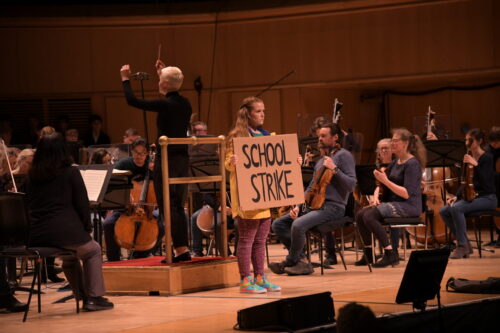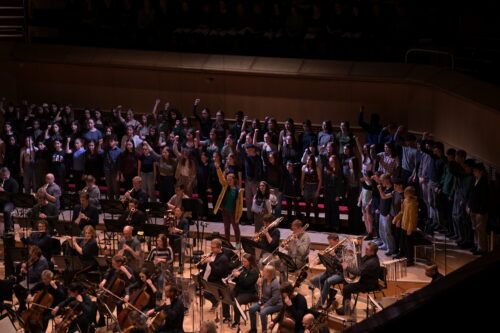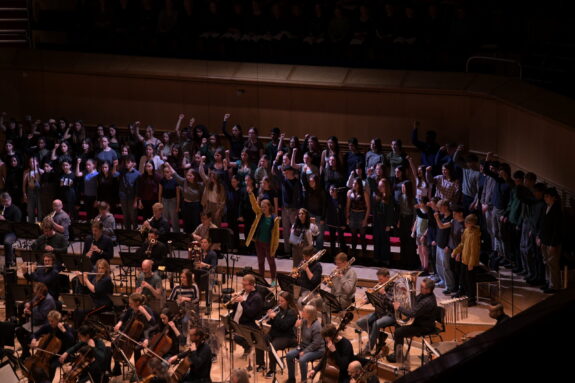 United Kingdom Jonathan Dove, Uprising: Soloists, RSNO Youth Chorus, RSNO Chorus Academy, RSNO Changed Voices, Royal Scottish National Orchestra / Ellie Slorach (conductor). Usher Hall, Edinburgh, 28.3.2025. (SRT)
United Kingdom Jonathan Dove, Uprising: Soloists, RSNO Youth Chorus, RSNO Chorus Academy, RSNO Changed Voices, Royal Scottish National Orchestra / Ellie Slorach (conductor). Usher Hall, Edinburgh, 28.3.2025. (SRT)

Climate activism might seem an unusual subject for an opera, but in his new piece Jonathan Dove takes the global climate strike and youthful environmental idealism and just about manages to make it work as a music drama.
Young Lola is made so anxious by mankind’s degradation of the planet that she refuses to go to school, and she begins a school strike for climate change. Neither her parents nor the townsfolk know how to deal with the strike’s growing momentum, and her mother’s job in construction requires that she cuts down a forest to build a road, with disastrous consequences when the river floods the town. However, Uprising ends with the tantalising possibility of hope as the family looks to the future and moves towards reconciliation.
You don’t have to be a detective to spot the heavy influence of the Greta Thunberg story on April de Angelis’s libretto and, in fact, Greta makes a brief appearance alongside some other young climate activists from across the world. In fairness to both Dove and de Angelis, however, the opera fulfils narrative expectations while transcending stereotypes, and the bulk of its success, as it should be, is down to Dove’s music.
He is without doubt the most successful and prolific living opera composer in Britain (or the world?) today, and his music for Uprising carries all the trademarks that have made him so; namely clarity that allows the words to shine through, an overall tonal approachability that builds the bigger picture while spotlighting detail, and especially an overall texture that twinkles and sparkles in a way that welcomes the listener while enlivening the story. Dove’s music gives spiritual voice to trees and to a river while also giving life to brattish schoolchildren and a pompous mayor. The constantly shifting colours give the story an extra dimension of life that the words alone would not, and de Angelis’s libretto both tells the story and gives it an eternal dimension as it contemplates extinction and the hope of salvation.

That said, it could do with some tightening. The second act, in particular, takes too long to make its (rather slight) point, and the big climate strike chorus at the end of Act 1 feels clunky and overdone. You could just about forgive that with the larger-than-life performances in this concert semi-staging, however. Sinéad O’Neill’s direction solves the staging problems admirably using gesture, colour and movement, and the various choral groups on stage throw themselves into it with gusto. The RSNO Youth Chorus, in particular, sound fantastically good, both as a collective and in the various solos they take.
Ffion Edwards is terrific as Lola, her bright, sparkling soprano cutting through the orchestra and giving both vulnerability and energy to the young girl’s quest. Marcus Farnsworth and Madeleine Shaw are great as the exasperated parents, and Edwin Kaye’s mayor and Rhys Batt’s nasty doctor both bring character to the lesser roles. The musicians of the Royal Scottish National Orchestra play the score with all the tintinnabulating sparkle that it needs, and Ellie Slorach conducts with a huge smile and with bags of energy. I got a strong sense that this community opera was a transformative experience for the many young people involved, and the enthusiastic cheers from the audience suggested that it might have been for them, too.
Simon Thompson
Cast included:
Lola – Ffion Edwards
Angela – Madeleine Shaw
Zoe – Julieth Lozano Rolong
Clive – Marcus Farnsworth
Doctor – Rhys Batt
Mayor – Edwin Kaye
Concert staging directed by Sinéad O’Neill
